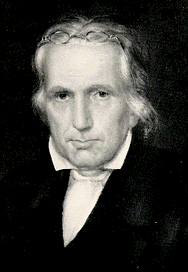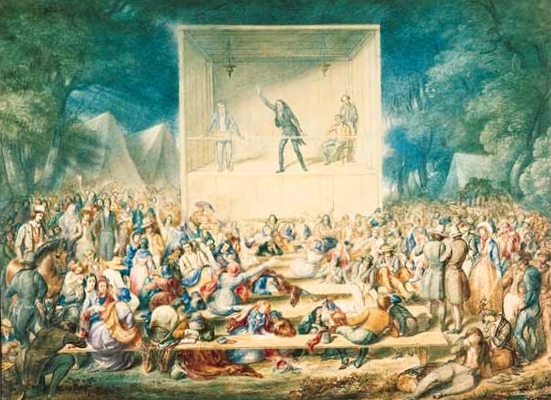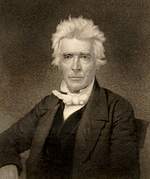|
Disciples Of Christ (Campbell Movement)
The Disciples of Christ (Campbell Movement) were a group arising during the Second Great Awakening of the early 19th century. The most prominent leaders were Thomas and Alexander Campbell. The group was committed to restoring primitive Christianity. It merged with the Christians (Stone Movement) in 1832 to form what is now described as the American Restoration Movement (also known as the Stone–Campbell Restoration Movement). History The Campbell wing of the American Restoration Movement was launched when Thomas Campbell published the '' Declaration and Address of the Christian Association of Washington'' in 1809. The Presbyterian Synod had suspended his ministerial credentials. In ''The Declaration and Address'' he set forth some of his convictions about the church of Jesus Christ, as he organized the Christian Association of Washington, in Washington County, Pennsylvania, not as a church but as an association of persons seeking to grow in faith.McAlister, Lester G. and Tuck ... [...More Info...] [...Related Items...] OR: [Wikipedia] [Google] [Baidu] |
Second Great Awakening
The Second Great Awakening was a Protestant religious revival during the early 19th century in the United States. The Second Great Awakening, which spread religion through revivals and emotional preaching, sparked a number of reform movements. Revivals were a key part of the movement and attracted hundreds of converts to new Protestant denominations. The Methodist Church used circuit riders to reach people in frontier locations. The Second Great Awakening led to a period of antebellum social reform and an emphasis on salvation by institutions. The outpouring of religious fervor and revival began in Kentucky and Tennessee in the 1790s and early 1800s among the Presbyterians, Methodists and Baptists. It led to the founding of several well known colleges, seminaries, and mission societies. Historians named the Second Great Awakening in the context of the First Great Awakening of the 1730s and 1750s and of the Third Great Awakening of the late 1850s to early 1900s. The First ... [...More Info...] [...Related Items...] OR: [Wikipedia] [Google] [Baidu] |
Mahoning Baptist Association
The Mahoning Baptist Association was an association of Baptist churches that was established in 1820 in Ohio's Mahoning Valley.Douglas Allen Foster and Anthony L. Dunnavant, ''The Encyclopedia of the Stone-Campbell Movement: Christian Church (Disciples of Christ), Christian Churches/Churches of Christ, Churches of Christ'', Wm. B. Eerdmans Publishing, 2004, , , 854 pages, entry on ''Mahoning Baptist Association'', pp. 501-502 Two prominent early Restoration Movement leaders, Alexander Campbell and Walter Scott, were closely affiliated with the Mahoning Association. The Association was dissolved in 1830. History The Mahoning Baptist Association was established in 1820. Even though the '' Philadelphia Confession of Faith'' was considered its "organic law," the Association was "filled with ideas of religious reformation" and both open discussion and doctrinal diversity were accepted. A congregation in Wellsburg, West Virginia, which was formed by Alexander Campbell after he left ... [...More Info...] [...Related Items...] OR: [Wikipedia] [Google] [Baidu] |
John Locke
John Locke (; 29 August 1632 – 28 October 1704) was an English philosopher and physician, widely regarded as one of the most influential of Age of Enlightenment, Enlightenment thinkers and commonly known as the "father of liberalism". Considered one of the first of the British Empiricism, empiricists, following the tradition of Francis Bacon, Locke is equally important to social contract theory. His work greatly affected the development of epistemology and political philosophy. His writings influenced Voltaire and Jean-Jacques Rousseau, and many Scottish Enlightenment thinkers, as well as the American Revolutionaries. His contributions to classical republicanism and liberal theory are reflected in the United States Declaration of Independence. Internationally, Locke’s political-legal principles continue to have a profound influence on the theory and practice of limited representative government and the protection of basic rights and freedoms under the rule of law. ... [...More Info...] [...Related Items...] OR: [Wikipedia] [Google] [Baidu] |
Philosophy
Philosophy (from , ) is the systematized study of general and fundamental questions, such as those about existence, reason, knowledge, values, mind, and language. Such questions are often posed as problems to be studied or resolved. Some sources claim the term was coined by Pythagoras ( BCE), although this theory is disputed by some. Philosophical methods include questioning, critical discussion, rational argument, and systematic presentation. in . Historically, ''philosophy'' encompassed all bodies of knowledge and a practitioner was known as a ''philosopher''."The English word "philosophy" is first attested to , meaning "knowledge, body of knowledge." "natural philosophy," which began as a discipline in ancient India and Ancient Greece, encompasses astronomy, medicine, and physics. For example, Newton's 1687 ''Mathematical Principles of Natural Philosophy'' later became classified as a book of physics. In the 19th century, the growth of modern research universiti ... [...More Info...] [...Related Items...] OR: [Wikipedia] [Google] [Baidu] |
Age Of Enlightenment
The Age of Enlightenment or the Enlightenment; german: Aufklärung, "Enlightenment"; it, L'Illuminismo, "Enlightenment"; pl, Oświecenie, "Enlightenment"; pt, Iluminismo, "Enlightenment"; es, La Ilustración, "Enlightenment" was an intellectual and philosophical movement that dominated Europe in the 17th and 18th centuries with global influences and effects. The Enlightenment included a range of ideas centered on the value of human happiness, the pursuit of knowledge obtained by means of reason and the evidence of the senses, and ideals such as liberty, progress, toleration, fraternity, and constitutional government. The Enlightenment was preceded by the Scientific Revolution and the work of Francis Bacon, John Locke, and others. Some date the beginning of the Enlightenment to the publication of René Descartes' ''Discourse on the Method'' in 1637, featuring his famous dictum, ''Cogito, ergo sum'' ("I think, therefore I am"). Others cite the publication of Isaac Newto ... [...More Info...] [...Related Items...] OR: [Wikipedia] [Google] [Baidu] |
John Locke By Herman Verelst
John is a common English name and surname: * John (given name) * John (surname) John may also refer to: New Testament Works * Gospel of John, a title often shortened to John * First Epistle of John, often shortened to 1 John * Second Epistle of John, often shortened to 2 John * Third Epistle of John, often shortened to 3 John People * John the Baptist (died c. AD 30), regarded as a prophet and the forerunner of Jesus Christ * John the Apostle (lived c. AD 30), one of the twelve apostles of Jesus * John the Evangelist, assigned author of the Fourth Gospel, once identified with the Apostle * John of Patmos, also known as John the Divine or John the Revelator, the author of the Book of Revelation, once identified with the Apostle * John the Presbyter, a figure either identified with or distinguished from the Apostle, the Evangelist and John of Patmos Other people with the given name Religious figures * John, father of Andrew the Apostle and Saint Peter * Pope J ... [...More Info...] [...Related Items...] OR: [Wikipedia] [Google] [Baidu] |
Millennial Harbinger
The ''Millennial Harbinger'' was a religious magazine established by the early Restoration Movement leader Alexander Campbell in 1830.Douglas A. Foster and Anthony L. Dunnavant, ''The Encyclopedia of the Stone-Campbell Movement: Christian Church (Disciples of Christ), Christian Churches/Churches of Christ, Churches of Christ'', Wm. B. Eerdmans Publishing, 2004, , , 854 pages, entry on ''Millennial Harbinger, The'', pp. 517-518Douglas A. Foster and Anthony L. Dunnavant, ''The Encyclopedia of the Stone-Campbell Movement: Christian Church (Disciples of Christ), Christian Churches/Churches of Christ, Churches of Christ'', Wm. B. Eerdmans Publishing, 2004, , , 854 pages, entry on ''Campbell, Alexander'', pp. 129-130 Campbell viewed the magazine as an important vehicle for promoting the religious reforms that he believed would help usher in the millennium. History Campbell began publishing the ''Harbinger'' on January 1, 1830, and it soon became a leading forum for the Restoration Move ... [...More Info...] [...Related Items...] OR: [Wikipedia] [Google] [Baidu] |
1689 Baptist Confession Of Faith
The Confession of Faith, also called the Second London Baptist Confession, was written by Particular Baptists, who held to a Calvinistic soteriology in England to give a formal expression of their Christian faith from a Baptist perspective. Because it was adopted by the Philadelphia Association of Baptist Churches in the 18th century, it is also known as the Philadelphia Confession of Faith. The ''Philadelphia Confession'' was a modification of the Second London Confession that added an allowance for singing of hymns, psalms and spiritual songs in the Lord's Supper and made optional the laying on of hands in baptism. History The confession was first published in London in 1677 under the title "A confession of Faith put forth by the Elders and Brethren of many Congregations of Christians, Baptized upon Profession of their Faith in London and the Country. With an Appendix concerning Baptism." It was based on the 'First London Baptist Confession of Faith'' (1644), Westminster Confes ... [...More Info...] [...Related Items...] OR: [Wikipedia] [Google] [Baidu] |
Evangelism
In Christianity, evangelism (or witnessing) is the act of preaching the gospel with the intention of sharing the message and teachings of Jesus Christ. Christians who specialize in evangelism are often known as evangelists, whether they are in their home communities or living as missionaries in the field, although some Christian traditions refer to such people as ''missionaries'' in either case. Some Christian traditions consider evangelists to be in a leadership position; they may be found preaching to large meetings or in governance roles. In addition, Christian groups who encourage evangelism are sometimes known as evangelistic or ''evangelist''. Etymology The word ''evangelist'' comes from the Koine Greek word (transliterated as ''euangelion'') via Latinised ''evangelium'' as used in the canonical titles of the Four Gospels, authored by (or attributed to) Matthew, Mark, Luke, and John (also known as the Four Evangelists). The Greek word originally meant a reward given ... [...More Info...] [...Related Items...] OR: [Wikipedia] [Google] [Baidu] |
Evangelism
In Christianity, evangelism (or witnessing) is the act of preaching the gospel with the intention of sharing the message and teachings of Jesus Christ. Christians who specialize in evangelism are often known as evangelists, whether they are in their home communities or living as missionaries in the field, although some Christian traditions refer to such people as ''missionaries'' in either case. Some Christian traditions consider evangelists to be in a leadership position; they may be found preaching to large meetings or in governance roles. In addition, Christian groups who encourage evangelism are sometimes known as evangelistic or ''evangelist''. Etymology The word ''evangelist'' comes from the Koine Greek word (transliterated as ''euangelion'') via Latinised ''evangelium'' as used in the canonical titles of the Four Gospels, authored by (or attributed to) Matthew, Mark, Luke, and John (also known as the Four Evangelists). The Greek word originally meant a reward given ... [...More Info...] [...Related Items...] OR: [Wikipedia] [Google] [Baidu] |
Walter Scott (Clergyman)
Walter Scott (1796 – April 23, 1861) was one of the four key early leaders in the Restoration Movement, along with Barton W. Stone, Thomas Campbell and Thomas' son Alexander Campbell.Douglas Allen Foster and Anthony L. Dunnavant, ''The Encyclopedia of the Stone-Campbell Movement: Christian Church (Disciples of Christ), Christian Churches/Churches of Christ, Churches of Christ'', Wm. B. Eerdmans Publishing, 2004, , , 854 pages, entry on ''Scott, Walter'' He was a successful evangelist and helped to stabilize the Campbell movement as it was separating from the Baptists. Biography Walter was born to John and Mary Innes Scott in 1796 in the town of Moffatt, Scotland. His parents, who were members of the Church of Scotland, hoped that he would become a Presbyterian minister. He spent six years at the University of Edinburgh, leaving in 1818. The same year he went to New York City at the invitation of his maternal uncle, where he taught languages at a school on Long Island. He s ... [...More Info...] [...Related Items...] OR: [Wikipedia] [Google] [Baidu] |






